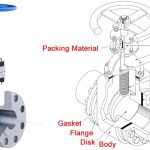On ships, marine diesel engines draw fuel from reservoirs or storage tanks which are also known as service tanks. All these tanks are provided with a specific valve known as quick closing valve, in order to shut the fuel supply in case of emergency such as fire. The closing of the valve can be done either manually, hydraulically or even by using compressed air. A typical arrangement consists of wire operated valves with wire pull livers located externally to the machinery space. If you want to know more about other types of valves, read these articles about gate valves, globe valves and butterfly valves.
Construction and Working
Quick closing valve is a kind of pressure reducing valve in which the an automatic process control valve for fluid pressure control is used for unmanned machinery spaces. This can be done by careful selection of valve trim, i.e. the parts of the valve that come in contact with the controlled fluid and form an actual control portion. The difference between pressure release valve and quick closing valve is that the later does not come in direct contact with the fluid it is controlling.
The lever is connected externally to a remote operating mechanism which might be pneumatic or hydraulic controlled. The controlling system has a piston which moves with the pressure of air or fluid and simultaneously moves the lever attached to it. The lever at the other end is connected externally to the spindle which is attached internally to the valve.The valve is a spring loaded valve which means that the spindle is placed through a spring which helps in re-positioning of the valve to the open position when the air or fluid pressure in controlling cylinder reduces.
All the quick closing valves are generally set in the open position.When the piston of the controlling cylinder moves up, the end of the lever which is connected to the piston moves up. As the lever is pivoted at the center, the other end of the lever moves down and pushes the spindle downwards. This closes the valve and shuts the flow of the fluid.

Controlling and Pre-loading Methods
As discussed earlier there are only two ways of controlling this valve.
§ Manual closing by turning the hand wheel clockwise
§ By operating the release mechanism that causes the spring loaded valve to shut immediately.
Methods to Pre-load
Pre-loading can also be done in two ways
§ By rotating the spindle in the clockwise direction till the release mechanism re-positions itself by sliding below the spindle nut and produce a clicking sound. Once this is done, the spindle should be rotated in anti clockwise direction until the end of the stroke is reached.
§ By pulling the hand wheel until the pin of the release mechanism clicks and repositions below the spindle nut.
Maintenance and Safety
Periodic maintainences and surveys of quick closing valve are absolutely essential. Checking the mechanism functions of the valve when the tank is not is used is necessary. Wires or remote operating system should be checked for slacking and oil levels respectively.
Quick closing valves should always be checked for open position. This can be done by turning the hand wheel in anticlockwise direction until the end of the stroke. The spindle nut will be stopped by the adjusting ring. Also, in order to ensure that the valve stays in the same position, trim gears are used.


